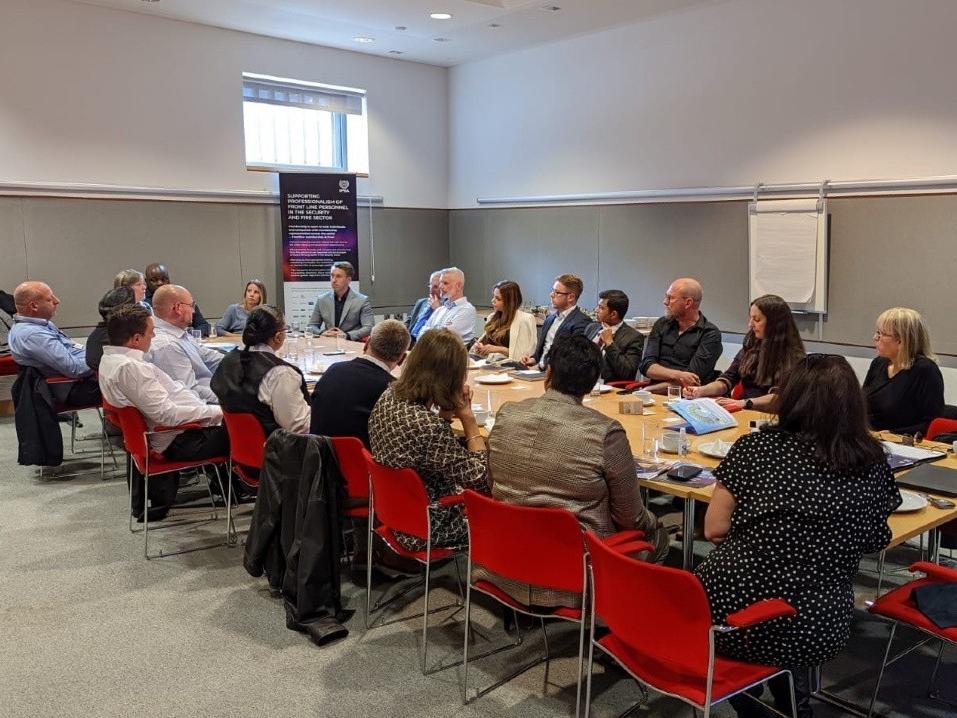
Brian Sims
Editor

Brian Sims
Editor
THE INTERNATIONAL Professional Security Association (IPSA) recently invited key stakeholders from the media and security industries to a stimulating round table discussion hosted at The British Library. The discussion was led by IPSA and the National Union of Journalists (NUJ) following their joint launch of “pioneering guidelines” for journalists and security officers earlier this year.

Professionals from both industries often find themselves working together in high-stress circumstances involving crime scenes, health incidents and public events, etc. Due to the nature of their roles, on many occasions the workers from both sectors experience disagreements and conflicts between their responsibilities.
Against that backdrop, the IPSA-NUJ Forum was organised to enable a dialogue between the two sectors on how to build a mutually respectful and beneficial relationship. Attendees present on the day represented every area of the two sectors, from suppliers through to clients, industry regulators, private service providers and front line staff.
Forum delegates taking part in the discussions included Satia Rai (welfare and ED&I director for IPSA), Arevika Stepanian (director of customer experience, STM Group), Pauline Dinis (regional manager, Securigroup), Una Riley (CEO, IPSA), Heather Baily QPM (chair, Security Industry Authority), Michelle Russell (CEO, Security Industry Authority), Kirsty Fairhead (security manager, Sodexo) and Abby Fullerton (joint CEO, Professional Security).
The discussion proved to be a great success, with an excellent stream of contributions from all parties.
All of the voices around the table shared their concerns, challenges and experiences, which were then discussed. In terms of moving forwards, suggestions from both sectors followed. One of the points highlighted is the need for adequate project briefings for private security officers on the basis that unclear assignment instructions can often lead to the improper handling of inflammatory situations. Simultaneously, it was pointed out that journalists must be made aware of the restrictions under which private security officers work and the limitations on the degree of access that they can provide.
Reflecting on the discussions, Richard Jenkins (CEO at the National Security Inspectorate) explained: “I was very impressed with the candour and respect shown by interested parties representing the media and front line security. Both professions are an essential part of our democracy. Developing opportunities and frameworks for better ways of working can only result in positive outcomes for these professions and the public they serve.”
Jenkins added: “It was abundantly clear that the parties involved are seeking a shared understanding to serve those on the front line in what are sometimes stressful circumstances. For their part, front line operatives deserve to be equipped to anticipate and manage challenging environments where public safety and property are to be protected and the public interest well served. To its great credit, IPSA has done a tremendous job in starting the conversation.”
Collaboration on guidance
Given that there is little in the way of specialist training provision or resources available to journalists and security officers on how to better communicate with each other, IPSA set out to address this issue by collaborating with the NUJ and developing the aforementioned first-of-its-kind guidance. Both the new guidelines and the forum are aimed at understanding how professionals from the two sectors conduct their work and educating them on each other’s roles and duties.
Natasha Hirst, vice-president at the NUJ, stated: “It was extremely useful to have a conversation with a wide range of representatives across the security industry and build on the work transacted by IPSA and the NUJ to date. We’ve learned much more about the challenges faced by front line security officers and had the opportunity to discuss the difficulties that arise for our members in the course of their work. We now look forward to continuing our collaboration to provide further training and resources for journalists, photographers and security officers.”
Una Riley, CEO at IPSA and organiser of the IPSA-NUJ Forum, concluded: “It was great to see the involvement from everyone in the room, especially so the front line personnel. This initiative is just a starting point, which is ultimately aimed at bringing both sectors together and foster a good relationship between media and security professionals. Everyone involved in the engagement between the two sectors holds responsibility towards improving the relationship and making the ongoing association stronger. This collaboration with the NUJ is a major milestone for both industries, and I very much hope that it encourages real efforts from all parties involved in building a positive and healthy working environment for journalists and security officers.”
Post-event feedback received from attendees to date signifies a huge success for the IPSA-NUJ Forum. The points discussed certainly resonated with individuals from both industries.
The outcomes of the discussion forum will have far-reaching impacts and, hopefully, change the way in which the two sectors work together for the better.
Dorset House
64 High Street
East Grinstead
RH19 3DE
UNITED KINGDOM
01342 31 4300